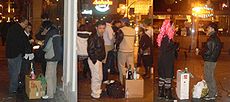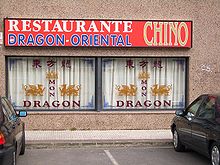- Chinese people in Spain
-
Chinese people in Spain 
Total population 145,425 (2009)[1] Regions with significant populations Madrid, Andalusia, Barcelona, Canary Islands Languages Related ethnic groups Chinese people in Spain form the ninth-largest non-European Union foreign community in Spain.[2] As of 2009[update], official figures showed 145,425 Chinese citizens residing in Spain; however, this figure does not include people with origins in other Overseas Chinese communities, nor Spanish citizens of Chinese origin or descent.[1]
Contents
History
 A Chinese wholesale clothing store in Zaragoza. The sign is in simplified characters, indicating comparatively recent (and PRC-based) origin of the local Chinese community
A Chinese wholesale clothing store in Zaragoza. The sign is in simplified characters, indicating comparatively recent (and PRC-based) origin of the local Chinese community
The first recorded arrivals of Chinese people to Spain, at least as visitors, date from the late 16th century. Bernardino de Escalante in his Discurso de la navegacion... (one of the first European books on China, published in 1577) says that among his sources of information were "Chinese themselves, who came to Spain" ("los mesmos naturales Chinas que an venido à España").[3] Juan González de Mendoza in his History of the great and mighty kingdom of China, wrote that in 1585 "three merchants of China" arrived in Mexico "and neuer staied till they came into Spaine and into other kingdomes further off." [4]
The first large wave of Chinese immigrants came to Spain in the 1920s and 1930s, working as itinerant peddlers. After World War II, they branched out into the restaurant industry, and later into textiles and trade.[5] However, the vast majority of Chinese residents in Spain started arriving in the country around the 1980s. According to Xu Songhua, president of the Association of Chinese in Spain (Asociación de Chinos en España), established in 1985, there are 13,000 Chinese-owned businesses in Spain, including 4,000 restaurants, 3,200 "dollar shops", 1,500 fruit shops, 600 wholesale warehouses, 80 Chinese groceries, 200 textile factories, and 120 photo processing shops.[6] Nowadays, Madrid, Barcelona, and the Canary Islands are home to the largest Chinese communities of Spain. Their population is growing rapidly; their numbers are estimated to have multiplied tenfold in just 13 years. Unlike earlier waves of Chinese immigrants in other countries, over 80% of the Chinese in Spain come from Zhejiang's Qingtian County, with smaller numbers from Guangdong and Fujian. Others have come from Hong Kong, Macau, and Chinese communities of Southeast Asia (especially Vietnam and Philippines), Latin America, and Europe.[6]
Demography
 A Chinese restaurant in Arrasate (Mondragon), in the heart of the Basque Country
A Chinese restaurant in Arrasate (Mondragon), in the heart of the Basque Country
The age structure of Chinese in Spain is skewed very young; 2003 figures showed only 1.8% aged 65 or older, as compared to 7% of the population of the People's Republic of China and 17.5% of that of Spain,[7] while over 17% were under the age of 15.[6] As a result of the small proportion of elderly, combined with long working hours and the illegal status of some, Chinese are reported to use medical services at a far lower rate than other ethnic groups in Spain.[8]
Ethnic relations
Despite the long history of Chinese settlement in Spain, they are often viewed as a "closed and mysterious community".[2] In Elche, protests over cheap imported merchandise from China undercutting local workers resulted in the burning of a Chinese-owned shoe warehouse. The Chinese have also been accused of making little effort to integrate into Spanish society;[9] one 2002 survey of 267 Chinese immigrants showed that only 27% could read and write Spanish, although 3% were monolingual in Spanish. Even long-term residents often send their children back to China for primary and sometimes secondary education; upon their return to Spain, their Spanish language skills are practically non-existent.[10] Only 15,000 have taken Spanish nationality.[6] Crime is also reported to be a problem in the Chinese community, with Triads acting to facilitate people smuggling from China, as well as demanding protection money from Chinese business owners. However, the Triads have not established themselves as drug distributors due to competition from other groups.[11]
Notable people
- He Zhi Wen, world-ranked table tennis player
See also
References
- ^ a b "Población extranjera por sexo, país de nacionalidad y edad (hasta 85 y más).", Avance del Padrón a 1 de enero de 2009. Datos provisionales, Spain: Instituto Nacional de Estadística, 2009, http://www.ine.es/jaxi/tabla.do?path=/t20/e245/p04/provi/l0/&file=00000010.PX&type=pcaxis&L=0, retrieved 2009-06-13
- ^ a b Nieto, G. (September 2003), "The Chinese in Spain", International Migration (Blackwell Publishing) 41 (3): pp. 215–237(23), doi:10.1111/1468-2435.00247
- ^ *Escalante, Bernardino de (1577), Discurso de la navegación que los portugueses hazen a los reinos y provincias del oriente, y de la noticia que se tiene del reino de China, Sevilla, http://www.upf.edu/asia/projectes/che/s16/escal.pdf, folio 100. (This is a modern transcription, with only slight modification to the original orthography. Full text as a PDF file.)
- ^ Juan González de Mendoza, The history of the great and mighty kingdom of China and the situation thereof. English translation by Robert Parke, 1588, in an 1853 reprint by Hakluyt Society. Page 95. Also quoted by Donald F. Lach. Modern annotations (as in the 1944 Spanish edition) note that this fact is absent in the first Spanish edition (Rome, 1585) but appears in the next Spanish edition (Madrid, 1586), meaning that Mendoza added a current fact to the new edition.
- ^ Beltrán Antolín, Joaquín (2003-02-01), "Diáspora y comunidades asiáticas en españa (Asiatic diaspora and communities in Spain)", Revista electrónica de geografía y ciencias sociales (University of Barcelona) 7 (134), http://www.ub.es/geocrit/sn/sn-134.htm, retrieved 2006-12-08
- ^ a b c d Gómez, Luis (2005-03-27), El poder chino en España (Chinese power in Spain), El País, http://www.elpais.com/articulo/portada/poder/chino/Espana/elpdompor/20050327elpdmgpor_1/Tes/, retrieved 2006-12-08
- ^ Aranda, José (2005-03-09), "La mortalidad de los inmigrantes chinos en España (Mortality of Chinese immigrants in Spain)", Cinco Días.com, http://www.cincodias.com/articulo/opinion/mortalidad/inmigrantes/chinos/Espana/cdsopiE00/20050309cdscdiopi_4/Tes/, retrieved 2006-12-07
- ^ Ly Pen, D. (July 2001), "Patologías prevalentes en pacientes de etnia china (Prevalent diseases of Chinese people in Spain)", Medifam 11 (7): pp. 34–44, http://scielo.isciii.es/scielo.php?pid=S1131-57682001000700004&script=sci_arttext, retrieved 2006-12-08
- ^ Guo, Xiaohong (2004-10-27). "Spanish Arson a Warning to 'Made in China'". China.org.cn. http://www.china.org.cn/english/BAT/110505.htm. Retrieved 2006-12-07.
- ^ Clements, J. Clancy (2002), "On Classifying Language-Contact Varieties", in Sayahi, Lotfi, Selected Proceedings of the First Workshop on Spanish Sociolinguistics, Somerville, Massachusetts: Cascadilla Proceedings Project, pp. 1–10, http://lingref.com/cpp/wss/1/paper1002.pdf
- ^ =Resa Nestares, Carlos (2001-12-07), Transnational organised crime in Spain: Structural factors explaining its penetration, Autonomous University of Madrid, http://www.uam.es/carlos.resa/text9.html, retrieved 2006-12-07
Further reading
- Nieto, Gladys (2003), "Overseas Chinese associations building up a national identity: specific cases in Spain", in Fernández-Stembridge, Leila, China Today: Economic Reforms, Social Cohesion, and Collective Identities, United Kingdom: Routledge, pp. 173–195, ISBN 0415312671
Immigration to Spain Africa Americas Asia China · India · Iran · Japan · Korea · Pakistan · PhilippinesEurope See also Overseas Chinese Africa Eastern AfricaEthiopia · Kenya · Madagascar · Mauritius · Mozambique · Réunion1 · Seychelles · Tanzania · Uganda · ZambiaElsewhereAmericas ElsewhereArgentina · Brazil · Canada (from Hong Kong) · Chile · Costa Rica · Mexico · Nicaragua · Panama · Peru · United States (Laotian Chinese)Asia Central AsiaEast AsiaSouth-East AsiaSouth AsiaWest AsiaEurope Bulgaria · Czech Republic · Denmark · France · Germany · Italy · Netherlands · Portugal · Romania · Russia · Serbia · Spain · Turkey · United Kingdom (from Hong Kong)Oceania 1 An overseas department of France in the western Indian Ocean. See also: Hong Kong DiasporaCategories:- Demographics of Spain
- Chinese diaspora
- Spanish people of Chinese descent
Wikimedia Foundation. 2010.
